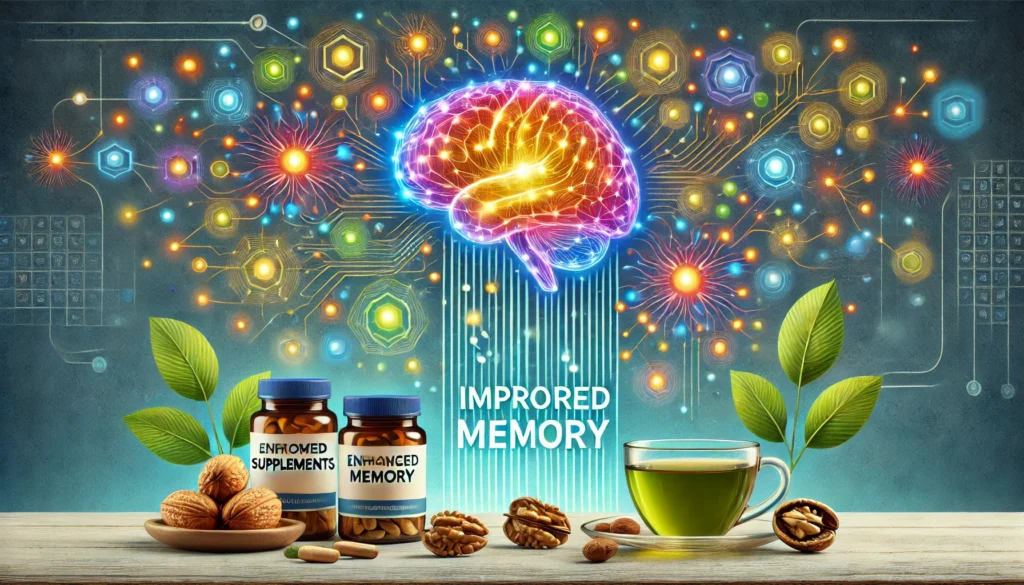Goa Powder, derived from the Agaricus bisporus mushroom species commonly known as the button mushroom, has recently garnered interest in the realm of dietary supplements for its potential nootropic effects. Nootropics, substances that may enhance cognitive function, particularly executive functions, memory, creativity, or motivation in healthy individuals, are often sought after in today’s fast-paced environment. This article delves into the chemistry, physiological mechanisms, potential benefits, dosage guidelines, side effects, and interactions related to Goa Powder, providing an exhaustive overview for those considering its use as a cognitive enhancer.
You May Also Like:
Keep Your Brain Young With the 5 Most Powerful Nootropic Supplements
Finding the Best Supplements for Brain Fog After COVID: 5 Top Brands Reviewed
Goa Powder: Potential Nootropic Benefits, Dosage, Side Effects, Interactions, and Other Important Information About This Supplement is an original (NootropicsPlanet) article.
Sources of Goa Powder
Goa Powder is primarily made from the button mushroom, which is cultivated and consumed worldwide. These mushrooms are known not only for their culinary versatility but also for their potential health benefits. Rich in vitamins, minerals, and antioxidants, Goa Powder is typically processed into a fine powder, making it convenient for incorporation into various diets. Key sources of Goa Powder include:
- Mushroom Cultivation: Primarily sourced from farms producing Agaricus bisporus, these mushrooms are harvested, dried, and ground into powder.
- Supplementation: Goa Powder is available in health food stores, online, and in various formulations, often combined with other nootropic substances or dietary supplements.
While individuals can consume the mushrooms themselves, the powdered form offers a concentrated source of active ingredients, making it a convenient option for supplementation.

Chemistry of Goa Powder
The active compounds in Goa Powder are primarily polysaccharides, beta-glucans, triterpenes, and various phenolic compounds. These components contribute to the potential nootropic effects attributed to the powder.
- Polysaccharides and Beta-glucans: These complex carbohydrates have been studied for their immune-boosting properties and potential neuroprotective effects. Beta-glucans enhance immune response and may influence cognitive health by promoting neurogenesis—the process by which new neurons are formed in the brain.
- Triterpenes: A group of chemical compounds that exhibit a range of pharmacological effects, including anti-inflammatory and antioxidant properties. These compounds may help protect brain cells from oxidative stress, which is linked to cognitive decline.
- Phenolic Compounds: These antioxidants combat oxidative stress in the body. By mitigating free radical damage, these compounds can contribute to overall brain health and cognitive function.
Understanding the chemical makeup of Goa Powder is critical in assessing its potential nootropic benefits and the mechanisms by which it may enhance cognitive function.
Physiological Mechanisms of Goa Powder in the Body and Brain
The cognitive-enhancing effects of Goa Powder can be attributed to several physiological mechanisms:
- Enhanced Neurogenesis: Research suggests that polysaccharides found in Goa Powder may stimulate the production of brain-derived neurotrophic factor (BDNF), a protein essential for the survival of neurons and the growth of new brain cells. Increased BDNF levels can lead to improved memory and learning capabilities.
- Antioxidant Activity: The presence of phenolic compounds provides strong antioxidant properties, reducing oxidative stress within the brain. This reduction in oxidative stress can help protect neural tissues and potentially lower the risk of neurodegenerative diseases.
- Neuroprotective Effects: The anti-inflammatory properties of triterpenes found in Goa Powder can shield the brain from inflammation-induced damage, which is often associated with cognitive decline and diseases like Alzheimer’s.
- Improved Blood Flow: Some studies indicate that components in mushrooms can promote vasodilation, or the widening of blood vessels, thereby enhancing cerebral blood flow. Improved blood circulation to the brain may lead to enhanced cognitive performance, particularly in areas related to memory and attention.
By understanding these mechanisms, it becomes evident how Goa Powder may contribute to cognitive health and performance.

Nootropic Benefits of Goa Powder
As a nootropic supplement, Goa Powder may offer various cognitive benefits, although research in this area is still emerging. Potential benefits include:
- Cognitive Enhancement: The combination of neurogenesis promotion and antioxidant properties may support enhanced memory, focus, and overall cognitive function.
- Mood Regulation: Certain components in Goa Powder may influence mood through neurotransmitter modulation. For instance, the improved brain function facilitated by neuroprotective compounds may help alleviate anxiety and depressive symptoms.
- Increased Energy Levels: By supporting mitochondrial function and promoting blood flow, Goa Powder may enhance overall energy levels, translating into improved mental performance, particularly during tasks requiring sustained attention.
- Neuroprotection Against Cognitive Decline: The antioxidant and anti-inflammatory effects of Goa Powder may play a crucial role in protecting against age-related cognitive decline and conditions such as dementia.
- Enhanced Learning Capacity: Some studies suggest that the compounds in Goa Powder may facilitate synaptic plasticity, which is essential for learning and memory. By enhancing the brain’s ability to adapt and reorganize itself, Goa Powder could potentially improve information retention and learning efficacy.
- Stress Resilience: The adaptogenic properties of Goa Powder may help the body manage stress more effectively. Modulating the hypothalamic-pituitary-adrenal (HPA) axis and reducing cortisol levels could improve mental clarity and cognitive performance, especially under stressful conditions.
- Improved Sleep Quality: Certain constituents of Goa Powder may promote better sleep quality by influencing neurotransmitters that regulate sleep cycles. Enhanced sleep quality is crucial for cognitive function, as restorative sleep contributes to memory consolidation and emotional regulation.
While these potential benefits are promising, it is essential to approach them with caution, as more extensive research is required to substantiate these claims.

Dosage and Supplementation Guidelines
When considering Goa Powder as a supplement, determining the appropriate dosage is essential. While no standardized dosage exists, general recommendations can be made based on existing literature and expert guidelines.
- General Dosage Recommendations: For cognitive enhancement, a typical dosage range of 1-3 grams of Goa Powder per day is suggested. This dosage provides sufficient active compounds while minimizing the risk of side effects.
- Form of Supplementation: Goa Powder is available in various forms, including capsules, powder, and extracts. The powdered form is often favored for its versatility, allowing easy incorporation into smoothies, soups, or other foods.
- Timing of Supplementation: Consistency is key for maximizing potential benefits. Taking Goa Powder daily, preferably at the same time each day, may enhance its effects.
- Duration of Use: Individuals may consider using Goa Powder for a minimum of 4-6 weeks to gauge its effects. Long-term use should be monitored, especially if taken in conjunction with other supplements.
As with any supplement, it is advisable to consult a healthcare professional before beginning supplementation, particularly for individuals with pre-existing health conditions or those taking medications.
Side Effects and Safety
Goa Powder is generally regarded as safe for most individuals when consumed at recommended dosages. However, some potential side effects may occur:
- Gastrointestinal Disturbances: Some individuals may experience mild digestive discomfort, such as bloating or diarrhea, particularly when beginning supplementation. Starting with a lower dose may help mitigate these effects.
- Allergic Reactions: Rarely do some individuals experience allergic reactions to mushroom-based products. Symptoms can include rashes, itching, or gastrointestinal distress. Anyone with a known mushroom allergy should avoid Goa Powder.
- Interactions with Medications: Goa Powder may interact with certain medications, particularly those affecting blood sugar levels, due to its potential to influence metabolic pathways. Individuals taking antidiabetic medications should monitor their blood sugar closely when using Goa Powder.

Interactions with Other Supplements and Medications
When considering Goa Powder in conjunction with other supplements or medications, it is vital to understand potential interactions:
- Anticoagulants and Antiplatelet Drugs: Goa Powder may enhance the effects of blood-thinning medications, increasing the risk of bleeding. Individuals on such medications should consult their healthcare provider before using Goa Powder.
- Blood Sugar Regulators: As noted, Goa Powder’s effects on blood sugar levels may interact with antidiabetic medications. Monitoring is essential to ensure blood sugar remains stable.
- Synergistic Nootropics: Goa Powder may be effectively combined with other nootropic substances, such as L-theanine or Rhodiola rosea, which can complement its cognitive-enhancing effects. However, care should be taken not to exceed safe dosage limits when combining supplements.
Risks for Individuals with Certain Health Conditions
Certain health conditions may necessitate caution when using Goa Powder:
- Diabetes: Individuals with diabetes should exercise caution, as Goa Powder may impact blood sugar levels. Monitoring is essential, particularly when beginning supplementation.
- Bleeding Disorders: Those with bleeding disorders or those undergoing surgery should avoid Goa Powder due to its potential anticoagulant properties.
- Pregnancy and Nursing: Limited research exists on the safety of Goa Powder during pregnancy and breastfeeding. As a precaution, women in these situations should consult their healthcare provider before supplementation.
Should You Consider Goa Powder as a Nootropic?
Goa Powder, with its rich profile of active compounds, offers a promising option for those seeking to enhance cognitive function. Its potential benefits, including improved memory, mood regulation, and neuroprotection, make it an intriguing candidate in the world of nootropic supplements. However, the current research is still in its infancy, and while preliminary findings are encouraging, more extensive studies are required to establish its efficacy and safety conclusively.
Individuals interested in incorporating Goa Powder into their supplement regimen should do so judiciously, starting with lower doses and monitoring for any adverse effects. As with any supplement, consulting a healthcare professional is essential, particularly for those with pre-existing health conditions or those taking medications that may interact with Goa Powder.
In summary, Goa Powder holds potential as a nootropic supplement, supporting cognitive health through its diverse active components. As research continues to unveil its full spectrum of benefits, it may become a valuable addition to the growing field of cognitive enhancement strategies.

References:
- Goa Powder – Uses, Side Effects, and More. Retrieved from: https://www.webmd.com/vitamins/ai/ingredientmono-460/goa-powder
- Goa Powder as a Remedy in Psoriasis. Retrieved from: https://pmc.ncbi.nlm.nih.gov/articles/PMC5130773/
- Anthralin and Chrysarobin: A Reexamination of the Origins and Early Use-Reply. Retrieved from: https://jamanetwork.com/journals/jamadermatology/article-abstract/543481
Important Note: The information contained in this article is for general informational purposes only, and should not be construed as health or medical advice, nor is it intended to diagnose, prevent, treat, or cure any disease or health condition. Before embarking on any diet, fitness regimen, or program of nutritional supplementation, it is advisable to consult your healthcare professional in order to determine its safety and probable efficacy in terms of your individual state of health.
Regarding Nutritional Supplements Or Other Non-Prescription Health Products: If any nutritional supplements or other non-prescription health products are mentioned in the foregoing article, any claims or statements made about them have not been evaluated by the U.S. Food and Drug Administration, and such nutritional supplements or other health products are not intended to diagnose, treat, cure, or prevent any disease.


